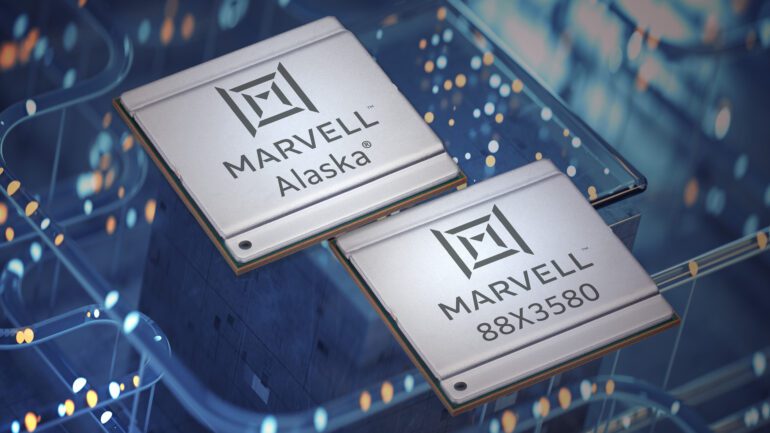- Marvell Technology secures contracts to assist U.S.-based cloud computing firms in crafting AI chips.
- Despite the prospect of $2.5 billion in sales by 2026, Marvell notes lower margins in its custom chip division.
- CEO Matt Murphy unveils current projects, including an AI chip for a third client scheduled for production in 2026.
- Investors express concerns over lower gross margins on custom chips but are reassured by Marvell’s commitment to maintaining operating margin targets.
Main AI News:
In a strategic move, Marvell Technology has clinched lucrative contracts to assist major U.S.-based cloud computing giants in crafting tailored chips for artificial intelligence applications. The announcement, made on Thursday, propelled Marvell’s shares downwards by 2.7% as company executives delved into the details during an investor briefing.
While Marvell anticipates the AI chip sector to reach a substantial $2.5 billion in sales by fiscal 2026, it acknowledges that its custom chip division operates on slimmer profit margins compared to other segments. Marvell’s collaboration involves aiding tech titans like Amazon.com in developing bespoke chips for their cloud infrastructure, positioning itself against formidable competitors like Broadcom, a key supplier to Alphabet, which foresees $10 billion in AI chip revenue this year.
CEO Matt Murphy underscored the company’s current projects, revealing a custom AI chip in production for a cloud computing behemoth and a central processor leveraging Arm Holdings’ technology for another client, both slated to yield revenue this fiscal year. Notably, Murphy unveiled Marvell’s engagement in developing an AI chip for a third client, slated for production in 2026.
Addressing investor concerns, Murphy explained the inherent trade-off between gross margins on custom chips and Marvell’s standard “merchant” chip offerings, emphasizing that while custom chips yield lower gross margins, operating margins are expected to align with the company’s targets over time.
As Marvell and Broadcom intensify their focus on custom chip divisions, analysts closely monitor the profitability trajectory, particularly against AI chip giant Nvidia. Broadcom, in a similar vein, disclosed in March that its custom chip margins are projected to match its corporate average.
Kinngai Chan of Summit Insights noted Marvell’s strategic shift, stating, “While the custom AI chip business promises significant growth for Marvell, management’s transparency regarding its lower gross margin projection is a pivotal development.” He added, “The company’s commitment to maintaining operating margin targets underscores its confidence that increased revenue will offset the margin disparity.”
Conclusion:
Marvell’s foray into the AI chip market signals a strategic move to tap into burgeoning opportunities despite the trade-off of lower margins in its custom chip division. While investors may be cautious about the margin dip, Marvell’s proactive approach and commitment to maintaining operating margin targets suggest confidence in offsetting the margin disparity through increased revenue. This dynamic underscores the evolving landscape of the semiconductor industry as companies navigate between growth potential and profitability.

